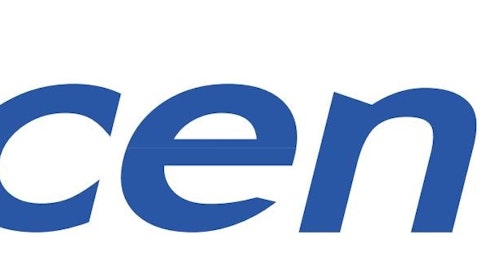Weibo has the potential to contribute to Sina’s top-line growth significantly with minimal impact on expenses over the next 2-3 quarters, which investors have not adequately priced into their models. Weibo now represents approximately 45% of Sina’s product mix shift, vs. 1% in the first quarter of 2012. This demonstrates that the company is moving away from its low-margin wireless services business. In addition, SINA Corp (NASDAQ:SINA) has recently announced that it has planned to sell an 18% stake in Weibo, its own version of Twitter, to Alibaba at a whopping $586 million. Over the long term, this partnership should be accretive to revenues, given the fact that connecting Alibaba’s large merchant base with Weibo’s large user base will expose additional opportunities for the company to consider expansions into social commerce.
Alibaba
The percentage of Chinese now using the Internet, roughly 40%, is about half of the Internet users in the US. Because this population will undoubtely grow as China appetite to consume online continues to expand, companies such as Alibaba – who integrate ecommerce with the proliferation of the smartphone and the internet – are slated to profit. Although not yet public, as one of the most highly anticipated IPOs since Facebook, Alibaba looks like it could command a valuation upwards of $100 billion (but more likely in the range of $50-70 million). While there hasn’t been a date set yet for the IPO, analysts expect a listing within the next few months — much closer than founder Jack Ma’s 2012 comment of “in the next five years.” In addition, Ma has stepped down as CEO on May 10, the company is currently undergoing a restructuring that, according to Ma, will create 25 new business units for the purposes of taking further advantage of the rapidly developing e-commerce landscape.
It seems fairly obvious that the world’s largest online retailer would attract a great deal of attention from investors. Alibaba’s net profits increased from $236.9 million in December of 2011 to $642.2 million by December of 2012. While these figures are undoubtedly impressive, at this juncture, Baidu.com, Inc. (ADR) (NASDAQ:BIDU) and Sina are China’s two internet giants, and the platform likely won’t be ceded to any large third player at this point in time. However, if you are interested in keeping your finger on the pulse of China growing pace, it is crucial to keep Alibaba in mind, even long after its IPO.
Appetite for volatility
The fact that the allure of Chinese internet stocks seems to have come and gone helps to rationalize the fact that winners ultimately will take all. If you have an appetite for volatility and the patience to keep up with the fast pace of development of these three companies, SINA Corp (NASDAQ:SINA) is the most attractive because of the potential for Weibo to be accretive to top line revenue thanks to China’s insatiable appetite for personal expression on the internet (micro blogging).
However, if you’re truly interested in investing in Chinese internet companies, keep in mind that you will need to have an appetite for volatility as well, given these stocks characteristically display fairly large movements in short periods of time. What makes a great internet company is pure innovation ingenuity. Thus far, Baidu has displayed the most potential to be China’s internet superstar. It just hasn’t demonstrated that it has the chops yet.
Colin Tweel has no position in any stocks mentioned. The Motley Fool recommends Baidu and SINA . The Motley Fool owns shares of Baidu.
The article China’s Netspace: Is the Explosion Over? originally appeared on Fool.com.
Copyright © 1995 – 2013 The Motley Fool, LLC. All rights reserved. The Motley Fool has a disclosure policy.




